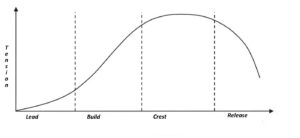Do you wonder what it means when you can’t let go of anger about the past? I did, too, until I learned three things, one of which totally rocked my world. This is my story.
“An Angry Young Man”
When I first started therapy, the psychologist told me I was “an angry young man.” I was offended. Who wouldn’t be? I’d just met this guy and here he was with some judgment about me! Of course, he was right, and my response confirmed it. Do psychologists enjoy toying with patients like that?
By that time in my life, I’d played Classical piano for about 30 years. A musician’s job is to convey emotion through music, and I was good at it. I could really feel all the emotions in my favorite music. Works by Beethoven, Brahms, Rachmaninoff, Chopin, and Debussy are so emotionally rich! as an example, here’s Evengy playing one of my favorite “fear and anger” pieces: “The Revolutionary Etude,” composed by Frederic Chopin when Chopin’s native Poland failed to win independence from Russia in 1831.
The interesting thing was that, as clear as my musical expression was, my verbal ability to talk about those feelings was all messed up. In fact, unless I was at the piano, I had a bass-ackwards way of understanding and communicating emotions.
One thing I learned in therapy was how to respond to triggering situations with more accurate emotions. Before, something that was obviously sad didn’t make me sad because I’d learned to laugh at sadness. Truly. Stiff upper lip and all. But that response got me in trouble with people I cared about when I offered them laughter and they wanted and deserved empathy. I had to reprogram my sadness response. That also held true for my fear and anger responses, and my joy response was very muted. In fact, I’d learned to have a very narrow range of emotional responses in every situation that didn’t involve music! Big feelings weren’t acceptable in my family of origin, and I’d learned how to adapt.
Therapy helped. In addition to a non-musical experience of my emotions, I started to learn how to use them correctly. I’m still working on that! Familiarity with sadness and joy began to change the way I was able to convey them to an audience. Fear was more difficult, but it, too, began to color my music in new ways.
I’ve also become much more familiar with my anger. It no longer lurks under the surface, ready to strike, making me chronically depressed. Now, my anger feels more like a tool I can deploy when necessary. I’m able to express different degrees of anger, appropriate for a variety of situations. But I still hold on to anger about some things from my past.
Past and Present Anger
There are things in my past that definitely called for anger. But I wasn’t feeling angry back then because I stuffed that feeling way down. So, with anger, I first had to learn how to not suppress the feeling, then I had to learn how to use the feeling properly. Then, and only then, could I begin to mine the past for leftover anger.
One big angry hole was, as you can probably guess, my emotional education. I’m still tempted to get angry and blame my upbringing for how screwed up my non-musical emotional expression was, but my response to that trigger has changed.
Today, when something triggers my anger, I let it. No problem with the feeling, provided I make a choice about how to express it. Anger is so immediate and powerful! But I’m not going to ram the car that cut me off just because of a moment of road rage. One of my favorite bumper stickers gets the hyperbole for this just right:

For me, today, the rough translation is: “I’m angry enough to do something stupid but probably won’t.”
I don’t remember the last time someone cut me off because these days I use humor to diffuse my road rage anger after it boils up. That seems to keep today’s anger from becoming tomorrow’s problem.
How to Not Let Go of Anger
Remember how I stuffed the anger deep inside? I got really good at that practice, even though that practice wasn’t really good for me. Instead of experiencing the anger and letting it go in the moment the way I do now with road rage, back in the day all that repressed anger just made me depressed. That was great for my music, but it wasn’t emotionally healthy for me.
My first lesson about unresolved anger is that, for me, it made me chronically depressed.
Honestly, who wants that? Had I known! But life doesn’t always get clearer until we’ve lived it for a while. If the world-rocking insight I had can help you avoid taking my path, that’s a good thing!
This is different than holding a grudge. I knew when I was doing that – still do – because of the resentment I felt – or feel – about the triggering event. Perhaps holding a grudge was my first healthy experience of anger?
So, as a young man, I was holding a lot of anger. Many years later, the therapist would be correct to say so! But I didn’t know that then.
Music Quest Discovery. Courage in anger.
Are you depressed? It could be repressed anger. If you have a way to seek advice and counsel from a qualified psychotherapist, please do! You could start a journey out of that depression to a much healthier emotional place, and you deserve it. That’s the journey I’m on and it’s much better than the alternatives.
Emotional Intelligence
There’s a lot of talk about emotional intelligence these days. That’s a good thing, but not if you – like me back in the day – have zero awareness of your emotions! At the piano? I was good. Everywhere else? I was a walking, talking emotional hairball. Nothing intelligent about that. In retrospect, if I’d tried to be emotionally intelligent in real life (away from the piano), I would have gotten it all wrong and probably made things worse for myself.
But there’s a reason for making the attempt to be emotionally intelligent, even if we get it wrong: it’s hard to stay connected to one another in a meaningful way! Practicing emotional intelligence can help.
My second lesson about anger from the past is that, for me, it jacked up my relationships.
We humans just can’t have meaningful relationships without empathy, which is a very good emotional intelligence practice, but it took me a series of failed relationships to begin to do empathy, and a number of years more to get any good at it. I had to really get to know how humans experience anger, fear, and sadness before I could empathize, and I’m still learning.
I happen to believe that this process of still learning, especially when it comes to my own emotional intelligence, is how things are supposed to be. For human beings, it’s a natural part of life. I can’t believe that anyone is simply born with an Oscar-winning “emotional intelligence quotient,” but I can believe that some of us have had more practice at it than others.
There are probably as many ways of being emotionally intelligent as there are human beings alive on the Earth, and I’m OK with that, provided I’m still practicing what it takes to improve AND still improving. My relationships now are so much different…in a good way! I feel that’s progress. If nothing else, it’s anecdotal evidence that something I’m doing is working better than it used to.
What Past Anger Does For Me Today
Chronic depression isn’t nice, but for many years it was my normal. I just didn’t know any other way. When I started to learn that first lesson (about how I was wearing my anger as chronic depression), I began to take slow, tiny steps into a new way of being. Past anger still propels me in the right direction, and in a weird way, I’m grateful for this awareness and all the piled-up past anger I still have since it fuels my journey.
Making better relationships is also a direct result of that work with depression and anger. Those feelings from the past help guide my empathy practice. I understand now how anyone with repressed anger could be so depressed, and, while there are many causes for depression, I’ve been able to connect in a meaningful way with many people who want something more fulfilling from their lives. So many men take their own lives out of despair. My best childhood friend was one of them. I continue the practice of unpacking my anger and learning emotional intelligence skills in his honor. Learning this second lesson has helped improve my relationships beyond what I ever thought possible.
The third lesson is the most difficult, but it’s also the one that blew me away. I only learned it in the last couple of years, so my practice is still improving. Here it is:
My third lesson was that I have zero control over the world. Zip. Zilch. Nada.
I know you’re wondering how that lesson could be so earth-shaking. After all, don’t we like to think we are in charge, that we make stuff happen, that people do what we ask? Yes, that’s one possibility…but the truth is that even the people in charge actually have very little influence over what will happen.
Not long ago I read a remarkable book by Michael A Singer titled “The Surrender Experiment.” Singer tells his professional life story, which is remarkable, especially when you realize that his success came, not a result of any effort to make it so, but because he allowed himself to surrender to what is. That’s a practice! Starting with his final year of grad school, all of Singer’s subsequent “decisions” following his primary choice to surrender to what is resulted in great happiness and peace, as well a financial success for his business and its employees. Singer believes that this is the best way to be in the world, and I have to agree.
Why was this so world-rocking for me? It wasn’t that I stopped making choices – I still do that. The difference is that my choices now, instead of being all about how I can reshape the world the way I think it ought to be, are now about my response to the world as it is.
Rage trigger? I feel as angry as I possibly can and then choose a humorous response.
Fear trigger? We know a lot about post-traumatic stress, thanks to the warriors who’ve sacrificed their well-being for so many years and the researchers who’ve helped us understand such things. I’ve had trauma-informed therapy, too, and recommend it to anyone with a partial lifetime of psychic build-up. I get scared, I allow that fear to guide my response, and I respond to care for myself as best I can.
Sadness trigger? I go there until I can’t cry anymore. If it feels right, I might look for some other more pleasant feeling to take over when I’m finished with the sadness, but this is a wash-rinse-repeat practice, since I often feel sad about things like my parents’ passing, or the state of my country, or having triggered someone I know in a way that wasn’t nice.
Notice that I’m not making a futile attempt to hide from anger, sadness, or fear? Being a shut-in comes with its own kinds of triggers, and they come in all emotional flavors.
Singer’s point, for me, was that all the energy I was putting into trying to control things – to prevent triggers – was wasted. Instead, I could use that energy to guide my responses to situations and enjoy a happier, more fulfilling life.
How Does Surrender Work With Past Anger?
It’s tempting to kick myself for not knowing then what I know now. I would have chosen a response instead of just knee-jerking! So many people got hurt and so many things were broken by the past me. And you know what? That happened. That was me…then.
Things still anger me from my past. The time my Dad chose to tell a bunch of people an embarrassing story about me…on the occasion of his 80th birthday when everyone was there to celebrate him. What can I do? Surrender. It happened. I was pissed off. And I still love my Dad, even though he passed away before I could say “I forgive you” to him.
My practice is to forgive Dad every time I think of this. Much better than holding on to anger and regret and having that fuel depression. This is how surrender puts that anger trigger totally within my control! It’s my response to the situation that matters most.
These days, when past anger shows up, I welcome it as an opportunity to strengthen my surrender practice. How does that look in real life? Here are the steps:
- I recognize that I’ve been trigged and accurately grok the feelings that trigger offers me;
- I fully accept the feelings, even if they aren’t what I want;
- When the feelings have spent themselves, I choose a response.
This is so much better for me than the place I was in as “an angry young man!” Mentally, physically, spiritually, and emotionally better.
The Science of Emotions and How to Let Go of Anger About the Past
The recent science of emotions is beginning to support this many-thousands-of-years-old approach. Researchers now suggest that our emotional response – that triggered feeling – happens when our advanced brains encounter something in real life where we have no prior experience or data, OR when our brains make an incorrect guess about the best response in a given situation.
The emotions we feel help prime our human system to respond appropriately, whether to a threat, an insult, the death of a loved one, or a joke. Most of the time our brains’ ability to predict the best response is accurate, but there are times when we get it wrong, like taking one more step at the bottom of the stairs, or jumping when we think we’ve seen something scary that turns out to be benign.
In this way, emotions can act like signaling tools to provide for increased blood flow to escape danger, or a calm, empathetic touch and soft words to a friend in pain, or protection when our family is threatened. Singer’s choice of surrender is apt because it facilitates the physiological process instead of wasting energy resisting it, and, once the flood of internal chemistry that creates our emotions has passed, Singer’s story proves the wisdom of a precise response made with minimal effort.
Once again, what’ the world-rocking realization? If you, like me, are still letting go of anger from the past, use that to fuel your present surrender and wise choice of response. It’s pithy but true, and the truth so simple that it even became a plot point in The Lion King: it’s in the past.
Stuck? Learn More About What It Means When You Can’t Let Go of Anger About the Past
We all could use a little help to let go of anger from the past now and then! Your skills improve with practice, but they can really improve with accountability. You can work alongside us to help supercharge your process by engaging healing music – music you love – for your wellness. Schedule a consultation here.
Or keep on reading, here.
Perhaps you’re ready for a deeper dive? The Musimorphic Quest, a fully-mentored online active-learning experience will immerse you in practical ways to meet life’s challenges with skills you may not realize you already have. It’s not for everybody, but you are that unique individual who really resonates with the power of music and wants to learn to wield it with skill, give it a try. The landing page is here.



